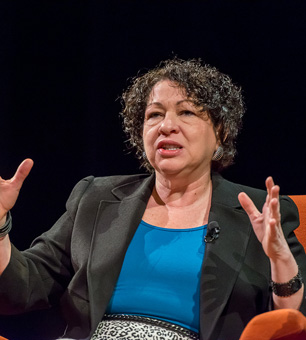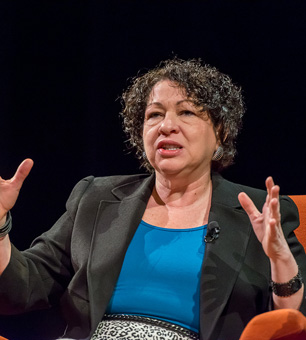 (Photo: Commonwealth Club / Flickr)Washington – A central provision of the Voting Rights Act of 1965 may be in peril, judging from tough questioning on Wednesday from the Supreme Court’s more conservative members.
(Photo: Commonwealth Club / Flickr)Washington – A central provision of the Voting Rights Act of 1965 may be in peril, judging from tough questioning on Wednesday from the Supreme Court’s more conservative members.
If the court overturns the provision, nine states, mostly in the South, would become free to change voting procedures without first getting permission from federal officials.
In a vivid argument in which the lawyers and justices drew varying lessons from the legacies of slavery, the Civil War and the civil rights movement, the court’s conservative wing suggested that the modern South had outgrown its troubled past and that the legal burdens on the nine states were no longer justified.
Chief Justice John G. Roberts Jr. asked skeptically whether “the citizens in the South are more racist than citizens in the North.” Justice Anthony M. Kennedy, whose vote is probably crucial, asked whether Alabama today is an “independent sovereign” or whether it must live “under the trusteeship of the United States government.”
Justice Antonin Scalia said the law, once a civil rights landmark, now amounted to a “perpetuation of racial entitlement.”
That remark created the sharpest exchange of the morning, with Justice Sonia Sotomayor on the other end. “Do you think that the right to vote is a racial entitlement?” she later asked a lawyer challenging the law, with an edge in her voice that left little doubt she was responding to Justice Scalia’s statement. “Do you think that racial discrimination in voting has ended, that there is none anywhere?”
The outcome of the case will most likely remain in doubt until the end of the court’s current term, in June. Many legal observers predicted that the justices would overturn part of the voting law in 2009, when the court had the same conservative-leaning majority, only to be proven wrong.
One important change, however, is that Chief Justice Roberts suggested in the 2009 ruling that Congress update its formula to determine which parts of the country should remain subject to the law. Congress has not done so.
The question at the heart of Wednesday’s argument was whether Congress, in reauthorizing the provision for 25 years in 2006, was entitled to use a formula based on historic practices and voting data from elections held decades ago.
Should the court strike down the law’s central provision, it would be easier for lawmakers in the nine states to enact the kind of laws Republicans in several states have recently advocated, including tighter identification standards. It would also give those states more flexibility to move polling places and redraw legislative districts.
The four members of the court’s liberal wing, citing data and history, argued that Congress remained entitled to make the judgment that the provision was still needed in the covered jurisdictions. The law passed the Senate unanimously and House overwhelmingly, by a vote of 390 to 33 in 2006.
“It’s an old disease,” Justice Stephen G. Breyer said of efforts to thwart minority voting. “It’s gotten a lot better. A lot better. But it’s still there.”
Justice Kennedy said that history taught a different lesson, referring to the reconstruction of Europe after World War II. “The Marshall Plan was very good, too,” he said. “But times change.”
Justice Breyer looked to a different conflict.
“What do you think the Civil War was about?” he asked. “Of course it was aimed at treating some states differently than others.” He also said that the nation lived through 200 years of slavery and 80 years of racial segregation.
Debo P. Adegbile, a lawyer with the NAACP Legal Defense and Educational Fund, which joined the government in defending the law, echoed that point. “This statute is in part about our march through history to keep promises that our Constitution says for too long were unmet,” he said.
The law was challenged by Shelby County, Ala., which said that its federal preclearance requirement, in Section 5 of the law, had outlived its usefulness and that it imposed an unwarranted badge of shame on the affected jurisdictions.
The county’s lawyer, Bert W. Rein, said that “the problem to which the Voting Rights Act was addressed is solved.”
In any event, he added, the unusual requirement that a sovereign state’s law did not count until blessed by the federal government required substantial justification. The law, he said, was “an unusual remedy, never before and never after invoked by the Congress, putting states into a prior restraint in the exercise of their core sovereign functions.”
It was common ground among the advocates and justices that the act was important and necessary when it was first enacted.
“There is no question that the Voting Rights Act has done enormous good,” Justice Samuel A. Alito Jr. said. “It’s one of the most successful statutes that Congress passed in the 20th century and one could probably go farther than that.”
There was agreement, too, that the nation and the South in particular have taken great strides toward equality.
“There isn’t anybody on any side of this issue who doesn’t admit that huge progress has been made,” Justice Ruth Bader Ginsburg said.
Most of the argument instead concerned the formula for determining which states the law covered.
Chief Justice Roberts reeled off statistics to suggest that the coverage formula no longer made sense. Massachusetts, which is not covered, “has the worst ratio of white voter turnout to African-American voter turnout,” he said. Mississippi, which is covered, has the best ratio, he said, with African-American turnout exceeding that of whites.
The more liberal justices responded that the nine states were responsible for a sharply disproportionate share of federal voting-rights violations, adding that Alabama was in a poor position to challenge the choices Congress made in deciding which parts of the country to cover.
“Under any formula that Congress could devise,” Justice Elena Kagan said, citing data about voting rights suits, “it would capture Alabama.”
The point seemed to interest Justice Kennedy, in one of his few questions skeptical of the law’s challenger. “If you could be covered under most suggested formulas for this kind of statute,” he asked Mr. Rein, “why are you injured by this one?”
Should the court strike down the coverage formula when it decides the case, Shelby County v. Holder, No. 12-96, Congress would be free to take a fresh look at what jurisdictions should be covered. But Congress seems unlikely to be able to agree on a new set of criteria, given the current partisan divide, meaning the part of the law requiring federal pre-approval of election changes would effectively disappear.
Justice Kennedy asked whether it would be proper to make the entire country subject to the provision. Solicitor General Donald B. Verrilli Jr. said no, at least based on the information compiled by Congress in connection with the 2006 extension of the law.
Justice Kennedy seemed to view the response as a concession. “And that,” he said, “is because that there is a federalism interest in each state being responsible to ensure that it has a political system that acts in a democratic and a civil and a decent and a proper and a constitutional way.”
Congress has repeatedly extended the preclearance requirement: for 5 years in 1970, 7 years in 1975, and for 25 years in both 1982 and 2006.
But it made no changes after 1975 to the list of jurisdictions covered by Section 5, relying instead on a formula based on historical practices and voting data from elections held decades ago.
It applies to nine states — Alabama, Alaska, Arizona, Georgia, Louisiana, Mississippi, South Carolina, Texas and Virginia — and to scores of counties and municipalities in other states, including the boroughs of Brooklyn, Manhattan and the Bronx.
Our most important fundraising appeal of the year
December is the most critical time of year for Truthout, because our nonprofit news is funded almost entirely by individual donations from readers like you. So before you navigate away, we ask that you take just a second to support Truthout with a tax-deductible donation.
This year is a little different. We are up against a far-reaching, wide-scale attack on press freedom coming from the Trump administration. 2025 was a year of frightening censorship, news industry corporate consolidation, and worsening financial conditions for progressive nonprofits across the board.
We can only resist Trump’s agenda by cultivating a strong base of support. The right-wing mediasphere is funded comfortably by billionaire owners and venture capitalist philanthropists. At Truthout, we have you.
We’ve set an ambitious target for our year-end campaign — a goal of $250,000 to keep up our fight against authoritarianism in 2026. Please take a meaningful action in this fight: make a one-time or monthly donation to Truthout before December 31. If you have the means, please dig deep.
